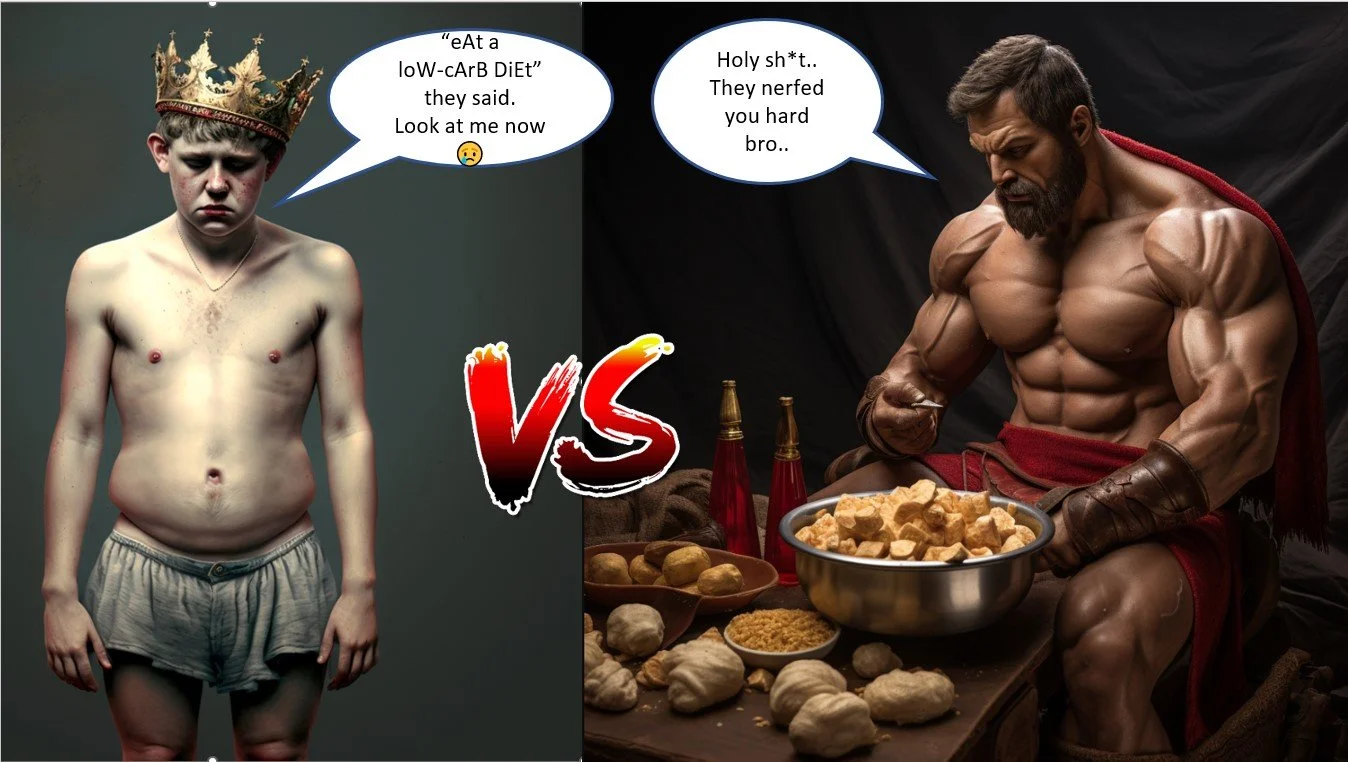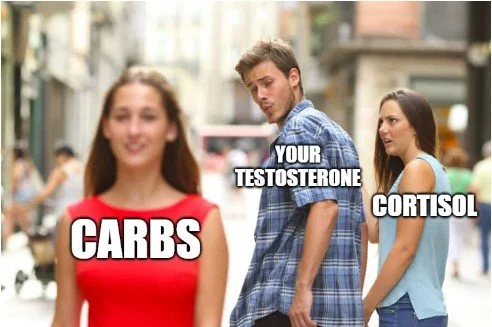Carbs Boost Testosterone, Muscle, & Strength !!
Low-carb diets are CRUSHING men’s free and total testosterone levels, and the evidence behind this is mounting (S, S, S, S, S, S).
The sad reality is that most men who lift and train hard are STILL not eating enough carbohydrates. By now, most men know the importance of fats (and moderate amounts of protein) for Testosterone production (S, S, S, S, S), but the importance of carbohydrates when it comes to boosting net androgen status still goes unnoticed.
Some negative consequences of eating a low-carb diet can include:
high cortisol levels
slower metabolism (low Thyroid hormones)
higher T3 to reverse T3 conversion (again, bad for metabolism)
slow glycogen replenishment
low IGF-1 levels
low free testosterone levels (from higher SHBG levels)
low DHT levels (the most masculine and androgenic hormone)
higher muscle protein breakdown
poor performance in the gym
poor performance in athletic or high intensity activities
low energy
micronutrient deficiencies (especially boron, magnesium, vitamin C, and potassium)
high inflammation (most antioxidant-dense foods are carb sources)
poor sleep
flat muscles (the “flat” look since carbs pull water into muscle cells)
low Testosterone to cortisol ratio
low dehydroepiandrosterone (DHEA-S) levels
and more.
These negative effects are further exaggerated the harder a person trains, since intense training drastically depletes glycogen stores and increases the brain and body’s demand for readily available glucose.
This is why people on a low-carb diet AND who train hard have astronomically elevated cortisol levels (the stress hormone), and a reduced testosterone to cortisol (T/C) ratio, since the body has to pump out excess cortisol in order to meet the high glucose demand.
The result? a lot of your hard earned muscle (or your expensive dietary protein) gets broken down and converted to glucose, and a lot of the cholesterol and pregnenolone that was supposed to be used for testosterone production gets wasted on cortisol production instead.
Don’t get me wrong, there are some benefits to a keto, carnivore, or low-carb diet, but only in specific cases (ie: person is extremely obese, insulin resistant, or has trouble controlling their appetite etc.).
Outside of those cases, most people who train hard will benefit substantially more from a high carbohydrate diet than a low-carb diet.
Just make sure to get the majority of your carbs from healthy nutrient-dense sources (such as fruits, nuts, potatoes, beans, quinoa, sweet potatoes, plantains, honey etc.), and to avoid piling on carbs on your sedentary days or on the days that you’re less active (else that will just eventually lead to insulin resistance and fat storage in the long run, which can lead to low testosterone since body fat is full of the estrogen producing aromatase enzyme).
Also, save the bulk of your “simple carb” sources for intra or post-workout window, to facilitate rapid glycogen replenishment.
To conclude, if you train hard (like any man should) and your goal is to maximize testosterone production, muscle mass, strength, recovery, metabolism, and to reduce cortisol levels, eat a high carbohydrate diet consisting of roughly 50 to 60% (no less than 40%) of your calories from nutrient-dense carbs, especially around training days. So for a 2500 calorie diet, this consists of roughly 312 to 375 grams of carbohydrates a day (and no less than 250 grams of carbs).
🛒If you want the BEST science-based, all-in-one training program, meal plan, testosterone guide, fat loss guide, and more, purchase my HSP Training Nucleus Overload eBook here.
It combines the latest science and my roughly 20 years of experience in NATURAL Testosterone, Muscle, and Fat loss optimization to answer EVERY single critical question you may have about training, nutrition, fat loss, and testosterone boosting, using a SIMPLE, No-BS approach, and at a HUGE discount (limited time -40% off if you’re subscribed to my YouTube channel).
You will also get unlimited FREE updates to ANY future editions of the eBook as a courtesy for supporting the channel and movement. Buy it now 👇
🤵Join my social media accounts here:
📱YouTube: https://www.youtube.com/@team3dalpha
📱IG: https://www.instagram.com/team3dalpha
📱Discord: https://discord.gg/A29dDVXVcg
📱Reddit: https://www.reddit.com/r/team3dalpha
📱Tik Tok: https://www.tiktok.com/@team3dalpha
🔗Link tree: https://linktr.ee/team3dalpha
Watch the YouTube video for this article 👇
SOURCES
Sallinen J, Pakarinen A, Ahtiainen J, Kraemer WJ, Volek JS, Häkkinen K. Relationship between diet and serum anabolic hormone responses to heavy-resistance exercise in men. Int J Sports Med. 2004 Nov;25(8):627-33. doi: 10.1055/s-2004-815818. PMID: 15532008.
Volek JS, Kraemer WJ, Bush JA, Incledon T, Boetes M. Testosterone and cortisol in relationship to dietary nutrients and resistance exercise. J Appl Physiol (1985). 1997 Jan;82(1):49-54. doi: 10.1152/jappl.1997.82.1.49. PMID: 9029197.
Hämäläinen E, Adlercreutz H, Puska P, Pietinen P. Diet and serum sex hormones in healthy men. J Steroid Biochem. 1984 Jan;20(1):459-64. doi: 10.1016/0022-4731(84)90254-1. PMID: 6538617.
Lopez DS, Wulaningsih W, Tsilidis KK, Baillargeon J, Williams SB, Urban R, Rohrmann S. Environment-wide association study to comprehensively test and validate associations between nutrition and lifestyle factors and testosterone deficiency: NHANES 1988-1994 and 1999-2004. Hormones (Athens). 2020 Jun;19(2):205-214. doi: 10.1007/s42000-020-00179-w. Epub 2020 Feb 19. PMID: 32077039; PMCID: PMC7323003.
Whittaker J, Wu K. Low-fat diets and testosterone in men: Systematic review and meta-analysis of intervention studies. J Steroid Biochem Mol Biol. 2021 Jun;210:105878. doi: 10.1016/j.jsbmb.2021.105878. Epub 2021 Mar 16. PMID: 33741447.
Lane AR, Duke JW, Hackney AC. Influence of dietary carbohydrate intake on the free testosterone: cortisol ratio responses to short-term intensive exercise training. Eur J Appl Physiol. 2010 Apr;108(6):1125-31. doi: 10.1007/s00421-009-1220-5. Epub 2009 Dec 20. PMID: 20091182.
Roland AV, Moenter SM. Regulation of gonadotropin-releasing hormone neurons by glucose. Trends Endocrinol Metab. 2011 Nov;22(11):443-9. doi: 10.1016/j.tem.2011.07.001. Epub 2011 Aug 18. PMID: 21855365; PMCID: PMC3205187.
Wrzosek M, Woźniak J, Włodarek D. The Combination of a Diversified Intake of Carbohydrates and Fats and Supplementation of Vitamin D in a Diet Does Not Affect the Levels of Hormones (Testosterone, Estradiol, and Cortisol) in Men Practicing Strength Training for the Duration of 12 Weeks. Int J Environ Res Public Health. 2020 Nov 1;17(21):8057. doi: 10.3390/ijerph17218057. PMID: 33139636; PMCID: PMC7662710.
Anderson T, Wideman L. Exercise and the Cortisol Awakening Response: A Systematic Review. Sports Med Open. 2017 Oct 10;3(1):37. doi: 10.1186/s40798-017-0102-3. PMID: 29019089; PMCID: PMC5635140.
Anderson KE, Rosner W, Khan MS, New MI, Pang SY, Wissel PS, Kappas A. Diet-hormone interactions: protein/carbohydrate ratio alters reciprocally the plasma levels of testosterone and cortisol and their respective binding globulins in man. Life Sci. 1987 May 4;40(18):1761-8. doi: 10.1016/0024-3205(87)90086-5. PMID: 3573976.
Whittaker J, Harris M. Low-carbohydrate diets and men's cortisol and testosterone: Systematic review and meta-analysis. Nutr Health. 2022 Dec;28(4):543-554. doi: 10.1177/02601060221083079. Epub 2022 Mar 7. Erratum in: Nutr Health. 2022 Dec;28(4):783. PMID: 35254136; PMCID: PMC9716400.




